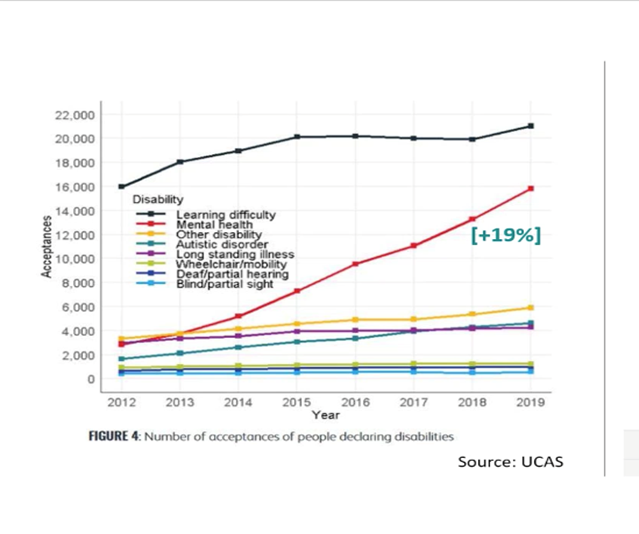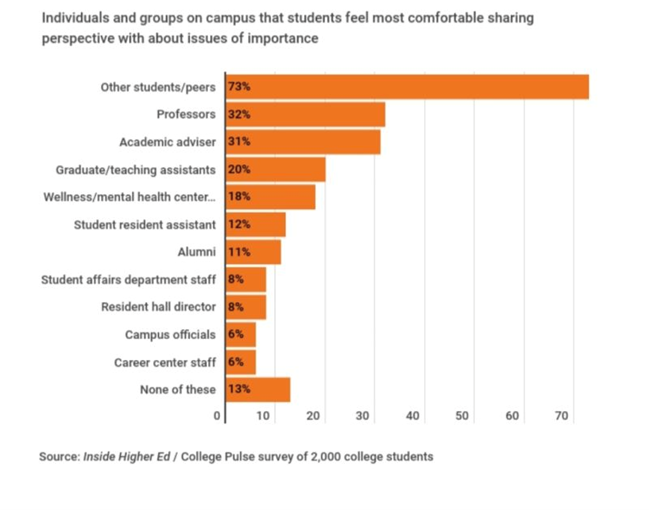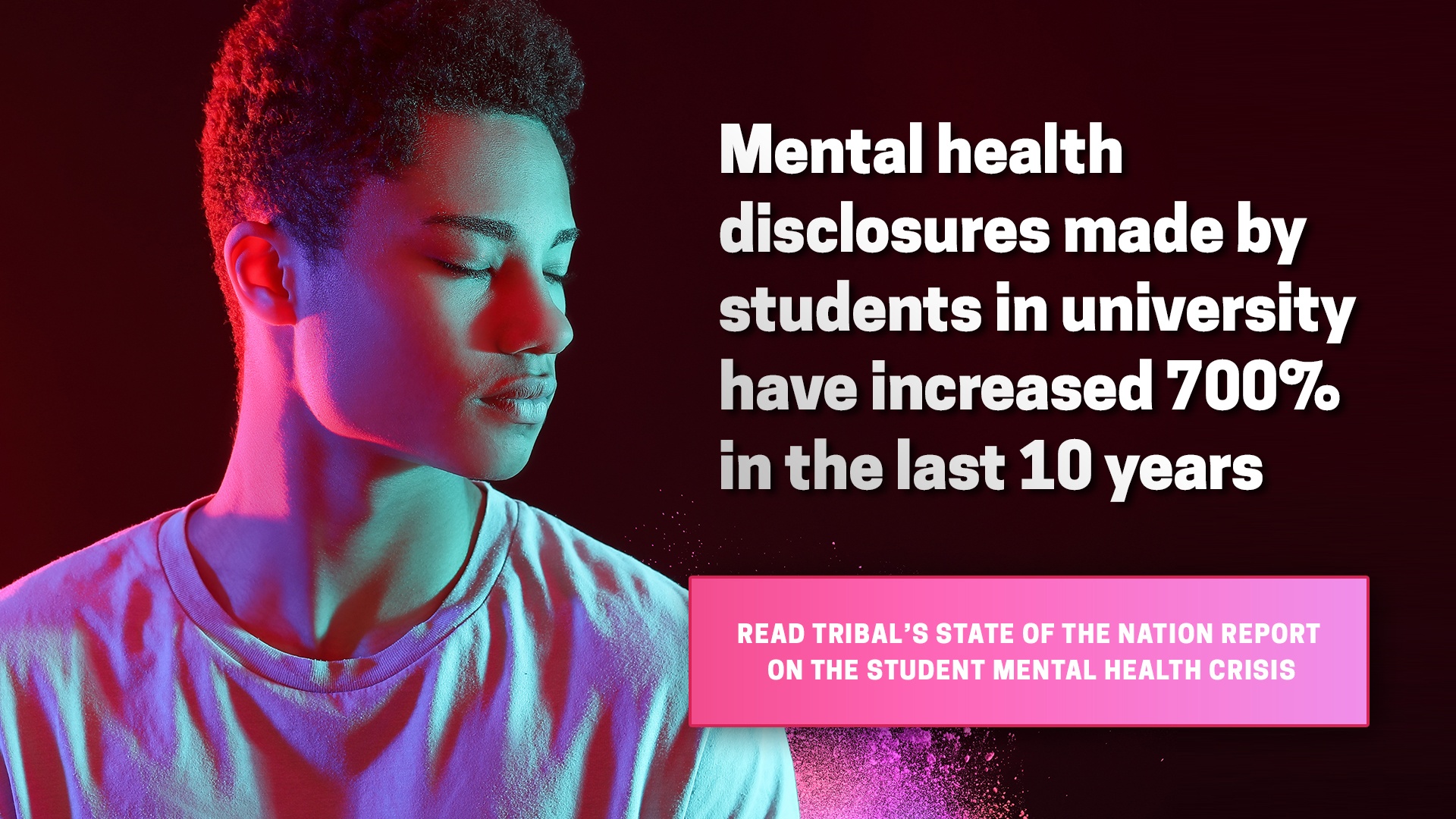Student mental health and wellbeing is proven to have a direct impact on student experience, satisfaction, attendance and engagement, achievement and future occupational performance. It needs to be a strategic objective for each and every higher education institution.
Whilst it has not always been the case, today, the UK offers a supportive framework in which to disclose mental health concerns. This change in culture and attitudes towards accessing mental health diagnoses and support is likely to be a significant factor in the 450% rise in the number of students declaring their mental health conditions on UCAS applications in the last decade.
Mental health (which covers a range of conditions from depression and anxiety, through drug and alcohol misuse, personality disorders, psychosis and schizophrenia, bi-polar, eating disorders, self-harm and suicide) is now on a higher growth trajectory than any other registered student medical condition over the same time period:
 Following a study like no other in the UK, Lee Rawlinson, Director of Institutional Research at Student Ventures, who analysed 20 different datasets between 2012-2021 to inform the recently published State of the Nation report on mental health in Higher Education, summarises:
Following a study like no other in the UK, Lee Rawlinson, Director of Institutional Research at Student Ventures, who analysed 20 different datasets between 2012-2021 to inform the recently published State of the Nation report on mental health in Higher Education, summarises:
There has never been a harder time to come into higher education. Pressure to succeed, higher debt levels than previous generations, near-constant distractors and an internal compass heavily influenced by social media mean that over the past decade, students have found themselves in increasingly dark places. Even before the global pandemic.”
Indeed, some of the pull out statistics from the recently published research make difficult reading:
- More than 1 in 4 students now disclose a mental health condition to their university - a 7x increase in the last 10 years
- 77% of all students have a fear of failure, with as many as 1 in 5 students saying this affects their daily lives
- 36% of students report that their wellbeing worsened since starting university
- 937 students drop out of university every day
- Every 4 days, a student takes their own life
- Two-thirds of university staff are considering leaving the sector within 5 years due to workload
Notably, the exponential rise in disclosures is despite the year on year decline in the 18 year old population over the same period. In 2020 alone there was a 9% rise in HE student numbers and the forecast is that these numbers will continue to rise. The graph below indicates that without reform of mental health support services, the volume of mental health disclosures is likely to overwhelm universities – most of which are already reporting caseload overload.

Whilst the record growth in students seeking mental health support at university correlates with the number of disclosures, worryingly the graph below shows that only around 30% of students report feeling comfortable sharing issues with their academic advisers, and far fewer are comfortable disclosing to university support teams.
 This data indicates that not all students that require support are requesting it. And despite this, universities cannot keep pace with the unsustainable growth in the number of students disclosing issues and accessing mental health support services.
This data indicates that not all students that require support are requesting it. And despite this, universities cannot keep pace with the unsustainable growth in the number of students disclosing issues and accessing mental health support services.
The spiralling costs of wellbeing
The stakes of getting a university’s approach to student mental health wrong – whether that’s due to the sheer volume of cases, insufficient resources or a lack of focus on the full welfare agenda – are extremely high.
University’s support frameworks are in the spotlight like never before, and with news reports polarising success and failure, there is no middle ground. The risk of insufficiently resourced services to deal with the mental health crisis is growing year on year, including the:
- Spiralling costs of wellbeing services in response to the rise in cases
- Financial implications of litigation in the case of negligence and failing to respond appropriately to the Duty of Care
- Reputational damage as a result of not being seen to do enough to support and safeguard students resulting in both student and staff recruitment challenges
- Higher rates of staff turnover as academic, pastoral and administrative staff leave the workforce due to burnout.
Of course, the provision of student mental health support services is far from the sole responsibility of Higher Education Institutions (HEIs), but demands on the NHS, particularly in recent years, have resulted in many HEIs having to step up - perhaps more than they should. Despite their efforts, the State of the Nation Report reveals that the sector’s current approach is failing students.
With this crisis ‘on our watch’, the report calls for more to be done to provide the right support, in time to make a difference.
Practical improvement opportunities for universities
"More than 25% or all university applicants already consider the institution’s provision of general mental health and wellbeing services before shortlisting. This number will continue to grow.”
Undeniably, the many pressures on all university staff, from leadership to support teams through academics and all non student facing employees, are multifaceted and not easily alleviated.
Mental health support is also just one in a wide range of general support requests that students make of their university, and there is a sector-wide need to streamline the capture and management of all support information to improve service delivery and student experience. Moreover, analysing the university’s data to determine which services are needed, when, is vital to inform the institution’s mental health and wellbeing support strategies.
Reassuringly, many UK universities are already on a journey of digital transformation, designed to improve student experience, help staff work smarter and future proof operations in the cloud. The question remains whether, without the focus of a dedicated mental health strategy, this will be enough to bring about the immediate step-change needed to improve student wellbeing in the sector?
Download the State of the Nation report for a full exploration of this subject, with inspirational examples of universities that are getting it right, and a summary of practical improvement opportunities that each and every university can embrace to improve and streamline the delivery of student support services to meet the ever-growing demand.
Download the full Student Support and Wellbeing report 
TOPICS:
SHARE THIS ARTICLE:




